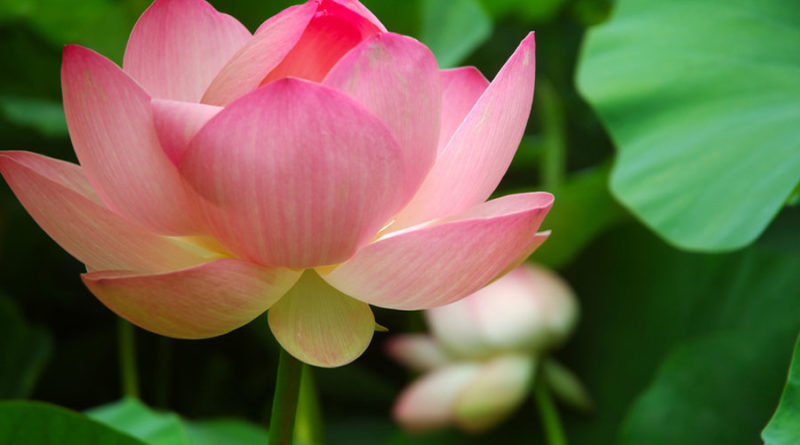A TECHNIQUE OF LIVING – 11. THE CULTIVATION OF DETACHMENT
ON looking at life as a whole, you will agree that it is a mixture of pain and pleasure, effort and rest, dissatisfaction and contentment. You would like this mixture to he proportioned differently, of course; you would like to have less pain and more pleasure; you would like a little less effort with a little more rest, and then you would be less dissatisfied and more contented.
But you must realise that without some pain and some sorrow in life there would be no incentive for effort; and without effort you cannot make progress. Without dissatisfaction your life would become too static to be of any ultimate value. It has been said:
The bread of bitterness is the food on which men grow to their fullest stature.
From the Buddhist viewpoint, liberation from suffering can be achieved only by transcending personal existence and by attaining to a state beyond words and beyond thought, a state which is sometimes called the Unconditioned or the Transcendental. This “existence-beyond-existence” is a state in which all traces of craving, aversion and ignorance have been destroyed, and in this state there is said to be no suffering. The attainment of this “existence-beyond-existence” is the ultimate goal of Buddhism.
However, while the separate self remains – while personal consciousness with its separation from life as a whole still exists – some degree of suffering is inescapable. Nevertheless it is possible to lessen its impact by the cultivation of detachment, or, stated differently, by the progressive reduction of attachment to the pleasures of life.
There is a Buddhist practice which consists of becoming aware, as fully as possible, of the feelings of pleasure and displeasure as and when they arise and at the same time observing them as dispassionately as possible. The aim, of course, of this increased attention is to evaluate more clearly the pleasures and displeasures of life and thus to avoid becoming overwhelmed by them.
Without this dispassionate or detached mental attitude you sometimes tend to become too immersed in your pleasures, and, at other times, to swing to the opposite extreme and become immersed in your sorrows and pains. There are times, perhaps, when you wallow in your emotions and let yourself be completely governed by them.
The objective, then, is to learn to stand off from your experiences both of happiness and of sorrow and to observe them dispassionately, without being swamped by them. You need to learn to do this in retrospect with regard to experiences of the past, and to try to do so also with experiences of the present just as they come to you; while in the same way you must learn to anticipate the experiences of the future without undue emotion. As you learn the futility of grasping at things of the present and yearning for things of the past and future, so your mind develops greater flexibility.
Whatever you depend on for your happiness is an object of attachment, a prop on which to lean; and whenever you lean on any prop at all you lay yourself open to sorrow. At any time there is the possibility that some of your props will be knocked away, for life has an unpleasant tendency to knock your props from under you.
Your youth disappears in the passage of time; you lose a loved one, perhaps, and the old familiar externals in your own individual world give place to new and strange externals. If your mind is not flexible enough to keep pace with the losses and changes as your props are knocked away, you suffer all the more in consequence.
Generally, however, on looking back, you may find that you manage to keep pace with the changes and the impermanence of life by exchanging one prop for another, so that in the long run you are little better off; you are still dependent on props of some kind.
And this applies not only to the outer world of sense-objects but also to the inner world of mind-objects, for attachment to memories of the past and anticipations of the future is just as strong a bondage as is attachment to external things of the present.
There is a Buddhist statement that goes like this:
From attachment comes grief, from attachment comes fear. He who is free from attachment knows neither grief nor fear.
The stronger is your attachment to something you love, the greater is the happiness you experience when circumstances allow you to enjoy it; but, when it is wrenched away from you, your suffering then is just as great as your happiness previously was.
If you strongly desire something, this thing becomes an attachment-object. You naturally cling to your attachment-objects, you grasp at them and clutch them tightly. When they are away from you, you long for their return. But all that this clinging, grasping, clutching, or longing does for you, in the long run, is to make the sorrow of loss so much greater.
It is axiomatic in the Buddhist philosophy that at some time or other you must part with everything that is nearest and dearest to you, and that the stronger is your attachment to these near and dear things, the harder will be the wrench when it comes.
Once the vice-like grip of attachment is established, it is impossible to break it by philosophising, and the strength of attachment depends on the strength of the craving for that which has been lost. Once the craving for the lost thing has gained a foothold it cannot be dislodged by theorising, and this craving can arise only when you allow yourself to be dominated by your feelings of pleasure and displeasure.
This is the Buddhist view of attachment and its related factors, a view that can be expressed in a simplified form in this way:
Attachment depends on craving; craving depends on the feelings of pleasure and displeasure; and the feelings of pleasure and displeasure depend on the contact of the senses with the external world.
In ordinary life, it is impossible to solve the problem of attachment by cutting off the contact of the senses with the outer world of sense-objects, and it is equally impossible to prevent pleasure and displeasure from arising once this contact is made. This means that if this chain of “dependent arising” (or, less accurately, this chain of cause and effect) is to be broken at all, it must be broken at the link of pleasure or displeasure. The chain of sorrow must be attacked at the phase of liking-and-disliking, desire-and-aversion, attraction-and-repulsion.
Now all this, at first glance, seems to mean that you must give up everything that gives happiness or pleasure; but this is not the idea at all. What it really means is that you must learn to be independent of your feelings of pleasure and displeasure, as far as possible, and not to be controlled by them. It means that your intellect must control your life, not your emotional complexes or, your irrational likes and dislikes; and thus it is essential (in the Buddhist technique at least) to become as fully aware as possible of all that goes on in your own mind.
In this technique, an ever-increasing mindfulness of all feelings of pleasure and displeasure as they arise is of great importance. Thus, in the first place, it is essential to be fully aware of the true value of your feelings of pleasure and of their real significance in order to prevent them from causing emotional biases and prejudices.
The same applies, of course, to your feelings of displeasure, for they also tend to give rise to emotional biases and prejudices if not well controlled. Aversion gives rise to craving and attachment just as does desire, and you are just as much in bondage to the things you hate as you are to the things you desire.
If you can reach even a partial degree of detachment, if you can even partially lessen your grasp on the things that hold you in bondage, you are then more free to enjoy them without attachment, and for the same reason your sense of loss will be less when they have gone.
The fully-alert mind can make an objective assessment of each experience as and when it arises; but for many of us this dispassionate self-observation cannot be made at the time and can be made only in retrospect. But whether you make it at the actual time of the experience or afterwards, the main thing is to prevent your pleasures and your displeasures from controlling you.
Once a strong emotional charge of a pleasant or unpleasant nature becomes attached to an idea, this emotional charge can easily get out of hand and cause all sorts of inner disturbance and outer conflict. Only by increased mindfulness can you free the mind from the false emotional associations and the consequent disturbance and conflict.
The cultivation of detachment, then, aims at freedom from emotional domination and from the domination of pleasure and displeasure; it aims at freedom from attachment to external things, from memories and anticipations, from desires and aversions, and even from the desires for detachment itself.
Practical work
THE CULTIVATION OF EMOTIONAL DETACHMENT
In the human mind there are many blind spots – blind spots which are sometimes the causes and sometimes the effects of prejudices and emotional biases – and because of these the mind is unable to see itself as it really is. Such blind spots prevent us from realising the extent and ramifications of our false attachments, and any device that we can use to reduce them is an aid in the work of inwardly-directed mindfulness.
The following questionnaire is meant to be such a device and to aid you in the process of discovering and evaluating your own attachments.
In answering the questions, you may find that the first answer that comes to mind may be the correct answer or it may not. Therefore it is desirable that you go through the full questionnaire about six times during the month; allow it to start trains of thoughts rather than trying to arrive immediately at clear-cut answers.
A question that is difficult to answer will as a rule be of much greater value to you than one which is easy to answer. The real value of the answer lies, not in itself, but in the amount of self-observation or mindfulness employed in arriving at it.
There is no need to try to make your answers consistent in any respect. You must realise that normally you have ambivalent attitudes towards many of the important things in life; for example, you could both love and hate the same person at different times, or you could feel attracted to one aspect of something and repelled by another aspect of it.
With ambivalent attitudes of this kind, it may be that one of the two contrary emotions has been repressed, but from some consciously-inaccessible region of your mind it continues to influence your mental life.
It is impossible to isolate your objects of attachment from your sense of possessiveness, your valuations, your self-assertiveness, or various other aspects of your mental life. The questions which follow, therefore, are intended, not to pinpoint specific objects of attachment, but to help you to develop a greater awareness of your own mental contents; and in the process specific objects of attachment – and perhaps of misplaced attachment – may emerge.
Here, then, are the questions:
1. Do I agree with the following statement? “From attachment comes grief, from attachment comes fear. He who is free from attachment knows neither grief nor fear.”
2. Am I unduly attached to material possessions, as a whole, or in other words do I have a possessive attitude to them?
3. Am I possessive with regard to other people-my family, my children, my friends, for example?
4. Do I desire power of some kind, not for what I could accomplish with such power, but purely for the sake of having power?
5. Do I have any attachment that interferes with my mental and emotional tranquillity?
6. Am I selfish or self-centred in any particular sphere of life?
7. Am I more dominated by emotional bias and prejudice than is the average person?
8. Do I like to dominate my friends, children, and other people?
9. Do I resent being dominated by others?
10. Am I too attached-rigidly or inflexibly so-to my beliefs and opinions in any sphere of thought?
11. Am I held back in any way by an excessive or misplaced attachment to anything or anyone?
12. Do I like people to admire certain of my possessions to which I am attached?
*
Any form of dispassionate observation-whether directed inwardly towards the mind itself or outwardly towards the world of events – is an aid in the cultivation of detachment. As a specific exercise in mindfulness, you can endeavour to apply the principle of dispassionate observation to your relationships with other people.
Sometimes you misunderstand something that another person says or does, perhaps because you happen to be upset or annoyed about something quite different. In such a case you give to the other person’s meaning a completely false colouring. Or perhaps you misinterpret a question, and give an answer which more properly applies to an altogether different question.
In this practice, then, and in your daily contacts with other people, you set out to pay unbiased, dispassionate observation to the other person’s meaning, uncoloured by your own emotions or prejudices. You will often find that the true meaning is quite different from your own first interpretation of it.
You may find it necessary to train yourself not to interrupt others without good reason. Few people are good listeners, and you may be one of the few; if you are not – if you hear only half of what another is saying, and if you tend to interrupt with irrelevant side issues – then you need to teach yourself to listen, as far as possible, without allowing your own emotional associations to interfere.
Good listening demands effort, for good listening means listening to all of what is said and interpreting it as correctly as possible. In the process of good listening you will learn to pinpoint any emotionally-charged words and ideas that arise, words and ideas that bring into play your own biases and prejudices. Thus, by pinpointing such words and ideas, they will no longer be able to work from the subconscious levels of your mind, and thus you will gain greater knowledge and control of your own mental processes.
The practice of dispassionate listening, then, consists largely of careful and attentive listening, coupled with an endeavour to keep free from emotional reactions.
*
Assuming that you are employing the self-contract method of self-discipline, look back every few days so see if you have used the questionnaire consistently and in a sufficiently penetrating manner, and if you have carried out the practice of dispassionate listening to a sufficient extent. If you feel that you have not done so, deprive yourself of some small pleasure.








